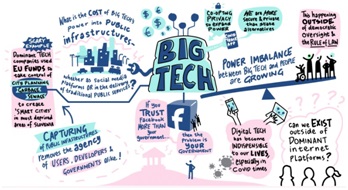

Context
Social media platform, Twitter, moved the Karnataka High Court over the government’s orders to block certain tweets and handles under Section 69 of the Information Technology Act 2000.
Analysis
Why Social media is a highly complicated issue?
- While the birth of social media is based on the democratic principles of the Internet and its technological ability to be open and accessible to all, it has evolved to not only be inclusive and participative but also
- The features of openness, obscurity and anonymity that once gave strength to marginalised communities are now giving room for malicious intentions to grow.
- It is now increasingly being blamed for
- breeding toxicity
- promoting polarization
- amplifying disinformation
- birthing malicious intentions
- swaying elections

Tech giants’ controversial incidences in India:
- Facebook (Instagram) in 2020, failed to take any action on the controversy called Bois Locker Room (mostly led by Indian teenagers).

- Facebook employees themselves are questioning the Facebook India team's content regulation practices and procedures.
- CCI (Competition Commission of India) opened two antitrust investigations against Google in 2020.
- One due to the unfair promotion of its own payment application (Google Pay).
- The other for engaging in anti-competitive practices by restricting companies from creating modified versions of the Android operating system for smart TVs.
- In 2019, the Enforcement Directorate (E.D.) launched an investigation into alleged violations by Amazon and Flipkart for their ban on foreign direct investment in business-to-consumer (B2C) businesses, except where specific conditions are met.
- Twitter displayed a map of Leh as part of China and later as part of the state of Jammu and Kashmir (rather than a separate Union Territory). Twitter was served with a legal notice for this.
How Tech giants create impact on India?
- Use of a targeting algorithm: Tech giants use user search data to serve ads to users. Ads are specifically targeted to users based on their recent internet searches.
- Lack of transparency and privacy concerns: The way technology companies process user data is not transparent enough. This raised serious privacy concerns and also prompted antitrust investigations by various governments. One such example is the Facebook Cambridge Analytica scandal. WhatsApp's recent privacy policy has also raised widespread concerns.
- Monopolistic business practices: tech giants engaged in predatory pricing and monopolistic business practices. They usually crowd out competitors through anti-competitive behavior. For example, the accusation on Amazon that it favors its own branded products over third party products.
- Social impacts: Big tech is the main medium for fake news, hate speech, etc. Countries considered these to be undemocratic activities.
- Influence on the legislative actions: The combined market capitalization of big tech is higher than the GDP of most countries except China and the US. Their sheer economic presence and market presence (as Google handles over 90% of online searches) forces them to create aggressive clauses in their terms of service, contractual agreements, etc.
How big techs are regulated in India?
- The government passed the Competition Act, 2002. The Act established the Competition Commission of India (CCI). The law was later amended in 2007. The CCI was established to eliminate practices that have an adverse effect on competition. The Commission also promotes and maintains competition, protects the interests of consumers. CCI will intervene if any of the tech giants engage in anti-competitive practices.
- For example, in 2018 the CCI closed an investigation into Google's advertising policies. The CCI said that Google abused its dominant position and engaged in anti-competitive practices. The CCI also imposed a fine of Rs 136 crore on Google.
- Second, the Information Technology Act, 2000 regulates all activities related to the use of computer resources in India. Some of the important provisions of the Act are
- Section 69 of the Act gives the government the power to issue directions to "intercept, decipher or monitor any information generated, transmitted, received or stored" in any digital device.
- Section 69A of the Act gives the government the power to block access to any information generated, transmitted, received or stored or hosted in the digital space.
- Intermediaries (providers of network services, telecommunications services, Internet services and web hosting) are required to store and maintain the specified information. They also have to obey the instructions issued by the government from time to time.
- In return, intermediaries are protected from legal action for user-generated content (big techs have used this clause to waive responsibility and liability in the digital space).
Conclusion
There will undoubtedly be a negative effect on Indian entrepreneurs and enterprises, and eventually the sovereignty of the nation, if the monopolistic and anti-competitive actions of giant tech firms are not reined in.


